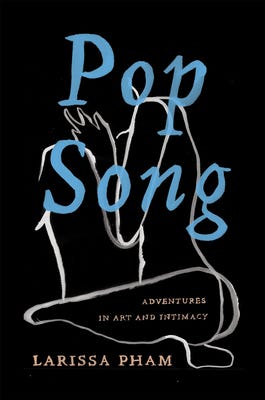We exist in real life
An argument against online shopping, or how buying a mattress radicalized me
This newsletter is normally about books, reading, and media in general. Today I’m here to spread the news about “going to stores.”
In 2016, my husband and I moved from Montreal to Toronto. At the time, he worked for an online publication that received free samples of products to include in their long-form SEO-driven blogs.1 They were not paid to give the free stuff a good review, but it’s much easier to review and endorse a product you can see and touch. One of those companies was an online mattress company. We were moving, so it made sense to accept their free mattress in our new city. Free mattress!
It arrived rolled up, encased in plastic like a sleep-tube hot dog. After off-gassing, we slept on that mattress for eight years. Around the same time we switched mattresses, I started a new job. I also started having neck pain, which I attributed to some kind of computer-related strain. Cutting to the chase, we recently got a new mattress and the neck pain disappeared. My mail-order mattress had exacerbated, maybe even caused, significant neck pain for eight years.
To replace the old mattress, we went to a store in the suburbs. There, a man in his mid-20s wearing a weird hat explained mattress types and told us to only get a higher-end mattress if we could feel the difference. He told us there is no difference in longevity after a certain price threshold ($700). The highest-end mattress at this suburban outlet cost about the same as every direct-to-consumer brand you’ve heard advertise on a podcast. After this explanation, he walked away and scrolled on his phone while we lay on a dozen or more mattresses. This, it turns out, is the ideal shopping experience.
My point is that we exist in real life. Maybe, just maybe, our mattresses should not come packaged in regular consumer mail, shipped in a tube. To be mailable, to be vacuum sealed into a hotdog-like cylinder and delivered to our home, the old mattress was made out of a slowly degrading foam. I’d assumed that something bought online with hundreds of reviews was “better” than something I could touch and feel in real life with my actual body. All this in spite of the fact that I knew the company was sending out free samples to be reviewed!
Back in 2016, I was young, foolish, accepting of a free mattress with the belief that my back, which had withstood 10+ years of a large chest2 and a computer addiction without prior issue, would last forever. Oh, how wrong I was!
You’re reading this on a screen, but your life is happening with the body holding the phone or scrolling the mouse. In the years since we bought that mattress many direct-to-consumer mattress companies (and other similar products) wound up opening retail stores themselves. People like to touch things! I am not alone! The sensory experience of the things in our lives impacts us — usually less dramatically than how that mattress fucked up my neck. The weight of a t-shirt, the exact hue of a lipstick, the hand-feel of a mug. And it’s not that I’m swearing off online shopping! There are obvious positives to online shopping. It provides a wider base of goods for people unable to reach stores for any number of reasons. It provides a wider base of consumers for smaller retailers and artists who would otherwise be unable to reach them.
And yet! In so many circumstances, the photos online may as well be flat lays for as much as they tell you what it would be like to hold, touch, or especially wear the thing. It is simply so much better to touch and feel things with your little raccoon paws before purchasing them and bringing them into your home.

And then, the obvious downside: the widening maw of overconsumption. How easy it is to buy more stuff, in multiples, when they’re pixels on a screen, existing only in the abstract. You have no idea what the thing feels like in three dimensions in your living room until it is taken down from its shelf, packaged in plastic, maybe one with the promise of biodegradability, and then shipped whatever distance to you.
Buying things online turns our desires into a problem we can solve by opening the right number of tabs. Wanting something means you need to find the optimal version of it. That’s the business model of Wirecutter, the Strategist, et all. Or to be more specific: their business model is affiliate revenue. I hear people paranoically saying that those review sites are paid for their positive reviews and the testing is all faked. I don’t think that’s true. The problem is much simpler: they are pulling mainly from a pool of items that are available to be affiliate-linked from an online retailer. There are lots of durable, quality high-thread sheets that you can touch at your local Winners, Marshall’s, etc! They’re never going to be listed on a review aggregate site designed to answer the problem you created for yourself.
The things that surround us have weight, feeling, and come to us at great cost.3 The flipside to your desires being transformed into a problem to solve via “research” is the impulse purchase. Inside you are two wolves: one is spending hours cross-referencing dozens of microwaves, and the other is impulsively buying a microwave’s worth of stickers. Insert your own recent shopping journeys here.
I fear this is turning into an elaborate “touch grass,” but instead, “touch sheets.” True, a little bit.
The challenge to myself, not always met but hopefully considered, is that while I remain healthy and hale enough to do so, I probably only want something as much as I am willing to find a place in the real world to look at a version of that thing. If I can’t leave my house for it, how much do I really want it?
Mattress image from In Bed: The Mattress as Art by Larissa Pham in The Paris Review. Here is my only book recommendation in this somewhat out-of-left-field post about online shopping: Larissa Pham’s wonderful book Pop Song: Adventures in Art & Intimacy, which is exactly as the subtitle describes.
Recommended if you like books about contemporary and modern art, travel, and stories about being a young adult. It’s a bit Livejournal-y (complimentary), and also inspired me to seek out the James Turrell installation at MASS MoCA which was absolutely worth making a reservation to see. The book has truly nothing to do with online shopping: the photo felt relevant and her book is good.
He no longer works for this company—a tragic loss to my household of the world’s most miscellaneous items and also the occasional window into the absolutely bonkers bananas world of PR trips. One time a hotel chain flew him to Austin, TX to promote the fact that they were now putting grills in their hotel rooms. Sure!
Otherwise known as “medical-grade titties,” or “honkin’ yonkers”
One of many potential examples, Carly Roberts’ deep dive into the material reality of jelly PVC shoes.






A small business I follow was sharing their struggles online about low sales and I thought - I totally get it and I would love to support you but how many more kitschy printed t shirts and sweatshirts do we all need where the shopping experience only includes browsing online?? If I am going to buy something unnecessary I want to take my mom, go to lunch, browse a one off boutique and impulse buy something there, where I can touch and pick the shirt with the best vintage feel and I can see the colors in real life.
Love this piece a lot
I'm a bit late to this, but we experienced nearly the same thing so reading this felt so validating lol. Bought a cheap online mattress, had it for 8 years (although TBH we should have gotten rid of it WAY before). It gave both me and my partner pain from day 1, more so as it got older. Recently the fibreglass inside it leaked out everywhere (absolute hell to clean!!!! also WTF!!!). We went to a local mattress shop in Canada as well, just on the west coast :). The staff were friendly, not pushy, and also super straight forward with what we needed and what we really didn't need. The mattress we got was even made in our city, which was cool. We just got our new mattress literally tonight. Really excited to not sleep painfully! I'm socially awkward, even at 30, so usually avoid in person shopping as it can be overwhelming but this experience was really rewarding in person and I cannot imagine shopping for a mattress online again, ever. I wholeheartedly agree with all your sentiments here!